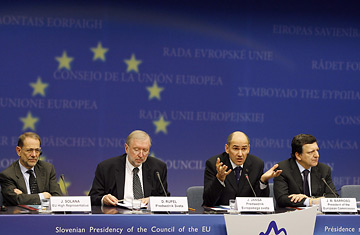
EU leaders Solana, Rupel, Jansa and Barroso (L-R), on the second day of a summit in Brussels, discussed ways to cut emissions and fight climate control.
The new, more finely-tuned implementation program is expected to strengthen the E.U.'s bargaining position ahead of the final negotiations on a successor to the Kyoto agreement, which are to be finalized at a summit in Copenhagen next December. E.U. leaders added that they could even offer a 30% cut in emissions by 2020 if a workable international agreement is reached.
They also backed plans to slash their energy imports, which would both save money and boost energy security. And they agreed to boost energy from renewable sources like wind and solar power to 20% by 2020.
The summit's chairman, Slovenian Prime Minister Janez Jan'a, said the blueprint to move to a low-carbon economy was nothing short of a "third industrial revolution." Giving the leaders' debate an added frisson was a warning that climate change could even spark wars. E.U. foreign policy chief Javier Solana presented the leaders with a report saying that global warming will have a growing impact on global security, multiplying existing threats such as shortages of food and water. His report said that climate change could cause millions of people to migrate toward Europe as other parts of the world suffer environmental degradation. He pointed to the conflict in Darfur, migration from flood-prone Bangladesh and continued instability in the Middle East as issues that already had an environmental dimension.
But despite the pledges, E.U. leaders still face some tough decisions on how to implement the agreed measures. Industries have complained that they will have to bear most of the burden, and German Chancellor Angela Merkel has warned she will not sacrifice the German car industry on the altar of emissions cutting. A last-minute change to the summit conclusions said emission targets should be introduced so as to "avoid excessive costs for member states," potentially opening the door to backsliding. Mahi Sideridou, a Greenpeace policy analyst, said the agreement had offered little beyond "some misplaced protectionist language to appease heavy industry." There are other uncertainties. Officials are already muttering that a promise to make biofuels account for 10% of fuels used for transport by 2020 would have to be amended in the face of already soaring food prices. And some countries are balking at the European Commission's recently unveiled proposals designed to make energy markets more competitive by splitting up companies that both sell energy to consumers and manage power lines. Germany and France are leading a group of countries hostile any such break-up.
What's more, the leaders have already rejected one measure touted as a boost to the environment: a plan to cut sales tax, or VAT, on green goods and services to just 5%. British Prime Minister Gordon Brown, backed by French President Nicolas Sarkozy, was politely rebuffed at the summit when he outlined his proposal to give favorable tax treatment to such products as low-energy light bulbs and fridges.
Brown and Sarkozy also found little support for their joint plan for levies on imports from countries not respecting similar high climate change rules, with outgoing Italian Prime Minister Romano Prodi warning of "an unending spiral of retaliations," if such a system is introduced.
But nonetheless, the trend appears to be in the direction of economic sacrifice for the sake of the environment. Slovenia's Jan'a said that the E.U. had a responsibility to take the lead in the talks on an accord for the post-Kyoto period after 2012. "By doing this we made a huge step forward," he said. "We are convinced that the costs of these measures will be much lower than if we don't act."
